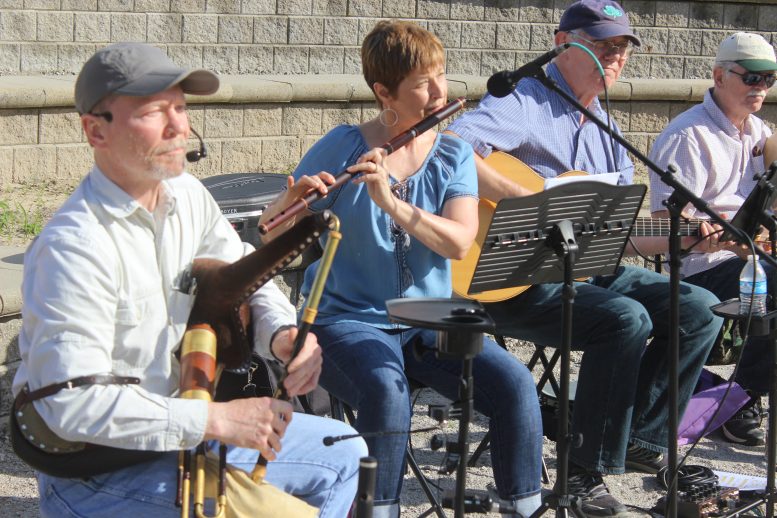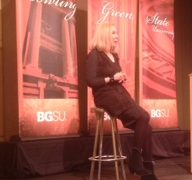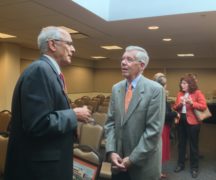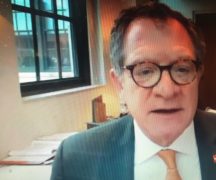By DAVID DUPONT
BG Independent News
Ask Bob Midden about his impending retirement as an administrator Bowling Green State University, and he will spend an hour telling you what he is not retiring from.
In the end, it’s clear even this is not a complete list. “Who knows? I will decide by the moment what seems most important, most rewarding, most enjoyable,” he said. This will be the first time since his sophomore year in high school that he’s had such freedom.
Midden, who came to BGSU in 1987 to help develop the Center for Photochemical Sciences, will retire June 30 from his position as associate vice provost and chemistry professor.
He said he’s dedicated not to do any more administration or management of large comprehensive projects and programs. “I am going to focus on my own work, my own research and writing.”
He’ll also continue working on a long-term project funded by the National Science Foundation that has students in grades 3 through 8 working on actual science research, commonly called “citizen science.”
The biochemist also plans to spend a third or more of his time on music. He plays traditional Irish instrumental music on uilleann pipes, antique Irish flute, and tin whistle in his quartet Toraigh and leads a larger, more flexible ensemble designed to help others learn the music.
He played flute in school band in middle school, but then set it aside until he started performing in church bands. He got hooked on Irish music after hearing it at the Lost Arts Festival in Grand Rapids. His first gig playing with an Irish pub band in 1993 on St. Patrick’s Day at Grumpy Dave’s sealed the deal. That’s led to seriously studying the music, and a passion both for performing and teaching it.
Midden also wants to advocate for teaching people to make evidence-based decisions. Before the Enlightenment people believed the world was far too complicated to understand — they left that up to God.
“Then science came along,” he said. “Science is based on how the natural world really behaves, based solely on evidence that’s collected in a very careful and rational way.”
He continued: “That concept of basing your conclusions on evidence that’s rigorously evaluated has made a huge difference on human life.”
For 3000 years, the humans lived on average between 25 and 40 years. Then in the late 19th century, using science, humans started addressing some of the issues limiting human life, he said.
They began to understand the basic concepts of hygiene and started to develop medical treatments such as antibiotics.
Now, Midden said, “it’s relatively rare for infants, children, teens, and young adults to die from disease.”
Certainly, he said, this science-based approach has led to some problems. And it deals only with what can be perceived by the senses and does not deal with the spiritual world.
Still “currently there are a lot of decisions that get made that are not based very well on evidence.”
That’s why even after his “so-called retirement,” Midden will continue his efforts to learn how to improve the way science is taught.
Midden has been studying science since he was a child growing up in Illinois. He started out by pulling apart a maple seed and discovering tiny tree inside. He wondered if the material he saw on a bee’s leg was honey. So he caught a bee by a wing and looked intently at it. Until, that is, he got stung.
Midden’s favorite presents were always science related, books and activities about rocks, birds, insects, the stars. “Anything that had to do with any aspect of the natural world excited me,” he said.
He ended up majoring in chemistry with a minor in biology at St. John’s University in the middle of Minnesota. The elderly nun who was his high school guidance counselor thought it was a good fit because it had an excellent science program and was remote — all the better to keep the young Midden out of trouble. Midden, who played football and basketball in high school and was involved in theater, wrestled at St. John’s.
He went on to earned a doctorate from Ohio State in bio-chemistry. That led to a faculty position at Johns Hopkins where he did research related to cancer and taught graduate students, medical students, and the very best undergraduates.
In 1987, Doug Neckers recruited him for the new Center of Photochemical Sciences at BGSU.
Despite knowing little about the university, he came and thrived.“This was definitely a good choice,” he said. “I enjoyed my time here and found it very rewarding.” Here he and his ex-wife Suzanne Midden, raised their three children.
Part of his new job at BGSU was teaching a large lecture section on chemistry to nursing and education students.
It was a very different experience than teaching at John Hopkins.
“Students here were asked to learn chemistry, but were not prepared to learn and didn’t know why they had to learn it,” Midden said. “It was a very disappointing experience for them and for me as well. … I knew chemistry could be inherently interesting and exciting. There were so many worthwhile things to learn about it, but this clearly was not the way to do it. I knew there had to be better way.”
So he set about finding it.
In about 2000 he taught chemistry to students fulfilling their general education science requirement. The classwork focused on the contamination of household water systems by crude oil from abandoned oil wells. The students tested water samples that the county Department of Health supplied them.
That led to the long-term NSF grant with younger students.
Midden and his fellow researchers worked with more than 3,600 students and 150 teachers in studying water samples. “The goal of that project was to integrate students in real science projects,” he said.
They collected water samples that were used by scientists “addressing issues directly affecting their local or regional community.”
Midden said the idea behind the study is that “when students are learning, when they’re doing things that matter to others, they’ll be more interested, they’ll put in more effort. And because they’e grappling with more complex concepts, they’re going to learn more deeply, they’re going to make better sense of it and develop stronger cognitive abilities.”
The grant runs through the end of the year. Research papers are forthcoming and there’s more work to do.
“We have this massive amount of data,” he said. “I’m determined to work on that until we’ve harvested as much useful information as we can.”
That’s not something Midden has any plans to retire from.





